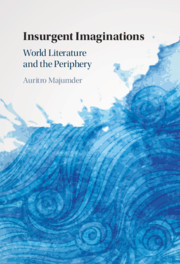Book contents
- Insurgent Imaginations
- Insurgent Imaginations
- Copyright page
- Dedication
- Additional material
- Contents
- Preface
- Acknowledgments
- Chapter 1 Peripheral Internationalisms
- Chapter 2 The Memoir and Anticolonial Internationalism in M.N. Roy
- Chapter 3 The Lumpen Aesthetics of Mrinal Sen: Cinema Novo Meets Urban Fiction
- Chapter 4 Black Blood: Fictions of the Tribal in Mahasweta Devi and Arundhati Roy
- Chapter 5 The Disappearing Rural in New India: Aravind Adiga and the Indian Anglophone Novel
- Chapter 6 Conclusion
- Works Cited
- Index
Chapter 5 - The Disappearing Rural in New India: Aravind Adiga and the Indian Anglophone Novel
Published online by Cambridge University Press: 18 November 2020
- Insurgent Imaginations
- Insurgent Imaginations
- Copyright page
- Dedication
- Additional material
- Contents
- Preface
- Acknowledgments
- Chapter 1 Peripheral Internationalisms
- Chapter 2 The Memoir and Anticolonial Internationalism in M.N. Roy
- Chapter 3 The Lumpen Aesthetics of Mrinal Sen: Cinema Novo Meets Urban Fiction
- Chapter 4 Black Blood: Fictions of the Tribal in Mahasweta Devi and Arundhati Roy
- Chapter 5 The Disappearing Rural in New India: Aravind Adiga and the Indian Anglophone Novel
- Chapter 6 Conclusion
- Works Cited
- Index
Summary
Chapter 5 discovers an unlikely source of caste and class politics in Aravind Adiga’s Anglophone novel of individual ambition The White Tiger ‘2008’. I propose that the novel recodes, through a series of parodies and formal allusions – rural lower-caste militants, who regularly appear at the margins of the plot and whose contrapuntal significance the majority of commentators have overlooked. The chapter re-illuminates the complex maze of subterranean flows that undercuts the novel’s surface narrative of a new India. I hold that traditions of the protest novel, epistolary narrative, modernist, and indigenous satirical genres are at work in the novel: these gesture to suppressed narratives of peripheral internationalism. My reading of the novel elaborates on the evolving significance of internationalism in twenty-first-century India, where the rural and the subaltern have been all but banished from cultural discourse.
- Type
- Chapter
- Information
- Insurgent ImaginationsWorld Literature and the Periphery, pp. 164 - 196Publisher: Cambridge University PressPrint publication year: 2020

